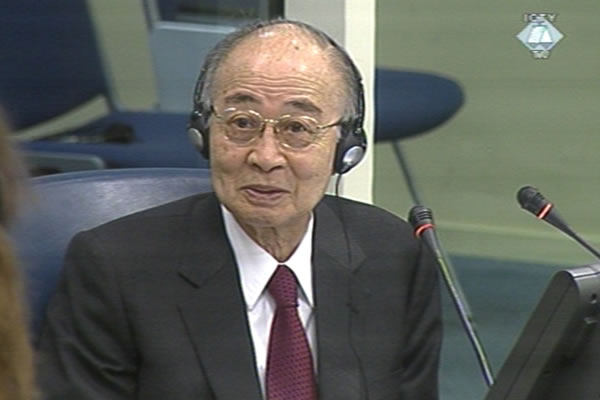Home
AKASHI: KARADZIC’S NONCHALANTLY DISTORTED TRUTH
The former special envoy of the UN Secretary General Yasushi Akashi complained in the cross-examination that he was once criticized for showing ‘inappropriate cordiality and courtesy’ towards Radovan Karadzic, while in fact he was just trying to ‘maintain the trust of all sides’. Quite soon, Akashi realized Karadzic was very skillful in ‘nonchalantly distorting of the truth’
 Yasushi Akashi, defence witness of Radovan Karadzic
Yasushi Akashi, defence witness of Radovan Karadzic Former special envoy of the UN Secretary General Yasushi Akashi testified today at the trial of former Republika Srpska president Radovan Karadzic. His testimony evoked his reports to the Secretary General and the UN Security Council during the war: it was diplomatic and neutral. Akashi was anxious to protect himself against possible allegations that he took sides. And yet in the end, Akashi was criticized just because he was ‘courteous’.
In the examination-in-chief Akashi said that Karadzic promised him several times he would allow Akashi to visit Banja Luka. As this never happened, it was a ‘constant source of frustration’, Akashi noted. Responding today to prosecutor Carolyn Edgerton the Japanese diplomat explained that he wanted to verify the claims that Muslims and Croats had been ethnically cleansed in Banja Luka.
Prosecutor Edgerton showed the witness his letter to Karadzic of 20 September 1994, in which he says that more than 2,500 persons had recently been expelled from Janja and Bijeljina and about 700 persons arrived in Central Bosnia. Akashi also reminds Karadzic that he had received Karadzic’s assurances that forcible expulsion ‘is not in line with the Bosnian Serb policy’. Akashi in the end warned Karadzic that those responsible for the crimes would be prosecuted.
‘I think the letter doesn’t call for additional clarification’, Akashi replied, adding that it ‘expressed how unhappy he was with the Bosnian Serb policy’. Akashi said that he sent a number of similar missives to Karadzic, but he was nevertheless accused of showing ‘inappropriate cordiality and courtesy’ towards the wartime Republika Srpska president. Today he says that he actually ‘tried to maintain the trust of all three sides’ in BH.
In his book In the Valley between War and Peace Akashi wrote that ‘as a negotiator Karadzic tended to nonchalantly distort the truth’. Commenting on that statement, Akashi described a meeting with Karadzic when they discussed the ‘blue helmets’ that were taken hostage by the Serbs. As it was quite obvious that Karadzic wasn’t speaking the truth some of Akashi’s associates suggested that the UN delegation should leave the meeting. The Russian representative Churkin was so annoyed by Karadzic’s lies that he left the meeting in high dudgeon. Akashi remained at the meeting ‘hoping that the hostages will be released’ but declined Karadzic’s invitation to stay for dinner.
As time went by, Akashi grew ‘more cautious’ vis-à-vis Karadzic’s promises; little by little, he realized that the words ‘promise’ and ‘agreement’ didn’t carry the same weight in the Balkans as in Asia.
The Bosnian Serb leadership ‘occasionally made wrong judgments’, Akashi said, illustrating his point with an example from 1995, when Akashi warned Slobodan Milosevic that NATO was about to launch a large-scale operation against the Bosnian Serbs. When Milosevic conveyed Akashi’s warning to Karadzic and Mladic they just ‘laughed’, Akashi recounted.
Prosecutor Edgerton reminded Akashi of his statement regarding the Markale incident: that the expert team he had established concluded that the shell could have been fired either from the Serb or the BH Army positions. Akashi confirmed that yesterday, before he answered Karadzic’s question, he didn’t have an opportunity to refresh his memory about what was in the report written 18 years ago. Also, Akashi confirmed that he didn’t know anything about the results of other investigations of that incident. Based on the findings of those investigations, the Trial Chamber and the Appeals Chamber in the Stanislav Galic case established beyond reasonable doubt that the shell that caused the Markale massacre on 5 February 1994 was fired from the VRS Sarajevo-Romanija Corps positions.
Radovan Karadzic’s trial continues on 6 May with the cross-examination of Stanislav Galic. The next witness on the list is Milan Martic, former president of the Republic of Serbian Krajina, who has been convicted by the Tribunal.
Linked Reports
- Case : Karadzic
- 2013-04-24 AKASHI TESTIFIES AS DIPLOMAT
- 2013-04-23 SUBPOENA FOR GENERAL ZIVANOVIC
- 2013-04-23 BOTH KARADZIC AND MLADIC IN COMMAND OF ARMY
- 2013-05-07 FOOLS WHO TARGETED SARAJEVO CIVILIANS
- 2013-05-08 GALIC: OTHERS ORCHESTRATED SARAJEVO DRAMA
- 2013-05-09 ‘PSYCHIATRIST’ MARTIC’S SHOWDOWN WITH DECEASED BABIC
